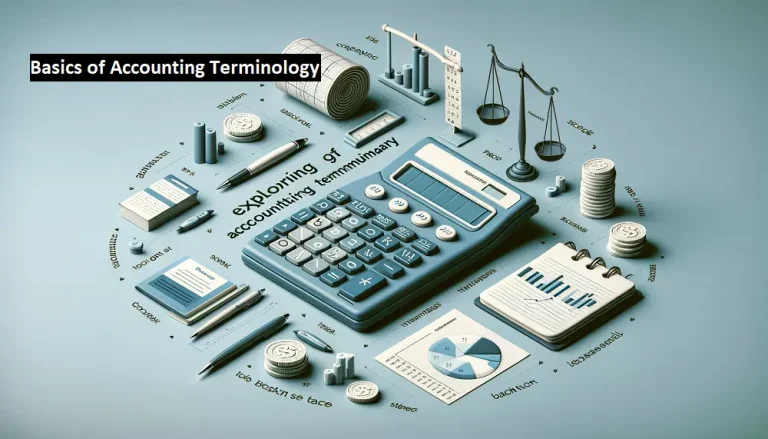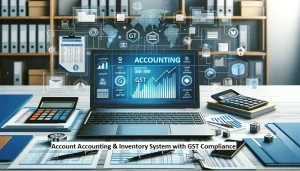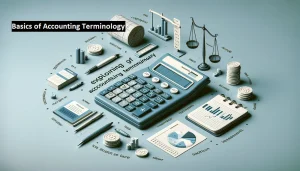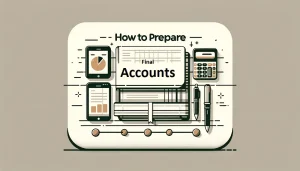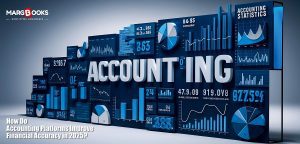Welcome to the world of finance made simple! In this easy-to-follow guide, we’re breaking down the basics of accounting terminology. Whether you’re a business owner, a student, or just someone curious about money matters, we’re here to demystify the language of finance. Let’s dive into the essential terms that form the foundation of accounting.
What is Accounting Terminology?
Accounting terminology is like a special set of words that helps people talk about money and keep track of it. It’s the language used to describe everything related to how much money comes in, goes out, and where it’s kept. Understanding these words makes it easier to manage money, whether it’s for a business or personal finances.
Basic Accounting Terminology and Definitions:
Let’s explore the Basic Accounting Terminology and Definitions:
- Assets: Assets are things a person or a business owns, like cash, stuff to sell, or even a building. They’re like valuable treasures.
- Liabilities: Liabilities are the things a person or a business owes to others, such as loans or bills to be paid. It’s like promises to give back something.
- Equity: Equity is what’s left over when you subtract what’s owed (liabilities) from what’s owned (assets). It’s like the ownership piece.
- Revenue: Revenue is the money a business makes from selling goods or services. It’s like the cash that comes in.
- Expenses: Expenses are the costs a business has in order to make money. It’s like the money going out.
Accounting Terminology and Meaning:
Accounting is the process of recording, summarizing, and analyzing financial transactions to provide a clear picture of a business’s financial health. Here are some key terms:
- Double-Entry Accounting: This means every money move is recorded in two places, keeping things fair and square. It’s like a balancing act.
- Accrual Accounting: This is about counting money when it’s earned or spent, not just when it’s received or paid. It’s like keeping track of promises.
Also read – The ABCs of Account Accounting & Inventory System with GST Compliance
Accounting Terminology Capital:
Capital in accounting is like the money a business has from its owners. It’s the total value of what the business owns, minus what it owes. This money can come from owners investing or putting in their own money. Capital is important because it shows how strong a business is financially and if it can handle different money situations.
- Working Capital: Working capital is the money available for everyday expenses. It’s like the pocket money for a business.
- Capital Expenditure: This is spending money on things that’ll be useful for a long time, like buying equipment. It’s like a long-term investment.
Accounting Terminology Invoice:
An invoice is like a shopping receipt. It’s a paper or digital note that tells you what you bought, how much it costs, and when you need to pay for it. It’s a way for sellers to show buyers what they owe for the things they’ve purchased. Think of it as a friendly reminder to settle the bill for the stuff you got.
- Invoice: An invoice is a bill that shows what’s been sold and how much it costs. It’s like a shopping receipt for business.
- Accounts Receivable: Accounts receivable is money others owe a business. It’s like IOUs waiting to be collected.
Also read – How to Streamline Your E Invoicing Process for Maximum Efficiency
Accounting Terminology with Examples:
Example 1: Depreciation
Depreciation spreads the cost of something valuable, like a machine, over its useful life. It’s like sharing the cost over time.
Example 2: Cash Flow Statement
A cash flow statement tracks the money coming in and going out. It’s like a diary for a business’s wallet.
Cost Accounting Terminology:
Cost accounting is like keeping tabs on the money a business spends to make its products or services. Direct costs are the ones linked to making stuff, while indirect costs are other expenses. Fixed costs stay the same, but variable costs change. Total costs add up all these costs. Cost accounting helps businesses manage money better by understanding and controlling their spending.
- Variable Costs: Variable costs change with how much is produced or sold. It’s like costs that flex with the business.
- Fixed Costs: Fixed costs stay the same, even if business changes. It’s like steady costs, such as rent.
Financial Accounting Terminology:
Financial accounting is like a money diary for businesses. It keeps track of what a company owns (assets), owes (liabilities), and how much money it makes (revenue) or spends (expenses). The balance sheet is like a snapshot showing what the company has at a specific time, while the income statement is like a report card on how well the company is doing over a period. The aim is to provide clear and honest money information for people interested in the business, like investors and managers, so they can make smart decisions.
- Financial Statements: Financial statements are reports that show a business’s money story. It’s like a financial report card.
- GAAP (Generally Accepted Accounting Principles): GAAP is the agreed-upon rules everyone follows when talking about money. It’s like the grammar of finance.
What Are the Basic Accounting Terminology:
Understanding these terms is like having a map for the money journey. Whether you’re planning for your own finances or steering a business ship, these basic terms are your guide. Ready for more? Stay tuned for our next installment, where we’ll explore advanced money talk and how it plays out in the real world.
Navigating Advanced Accounting Concepts
Now that we’ve got a solid grasp of the basics, let’s set sail into the deeper waters of advanced accounting concepts. Remember, we’re keeping it simple and straightforward, so you can confidently navigate the complexities of finance.
Advanced Accounting Concepts:
- Accruals and Deferrals: Building on our earlier discussion of accrual accounting, let’s talk about accruals and deferrals. Accruals happen when a business recognizes revenue or expenses before the cash actually comes in or goes out. Deferrals, on the other hand, occur when transactions are recorded in advance, but the actual cash movement happens later.
- Amortization: Similar to depreciation, amortization spreads out the cost of intangible assets (like patents or copyrights) over time. It’s like paying off the cost bit by bit.
- Financial Ratios: Financial ratios are like health check-ups for businesses. They compare different financial numbers to give a sense of a company’s performance. Common ratios include the debt-to-equity ratio, which shows how much a company relies on debt compared to its own money.
Industry-Specific Accounting Terminology:
Industry-specific accounting words are special money words used in different types of businesses. They help people talk about money stuff in a way that makes sense for their specific job. Like in healthcare money talk, they use words like “patient money” or “bad debt ratio.” In building things money talk, you might hear words like “work in progress” or “retention funds.” These special words help everyone understand and talk about money in their own kind of work.
- IFO (Inventory, Finished Goods, Open Orders): For businesses that sell products, IFO helps track what’s in stock, what’s ready to sell, and what’s still on order. It’s like a backstage pass to a store’s inventory.
- COGS (Cost of Goods Sold): COGS represents the direct costs of producing goods sold by a company. It includes costs like materials and labor. It’s like the cost of making the stuff a business sells.
International Accounting Standards:
International Accounting Standards (IAS) are like universal rules for companies when they write down their money stuff. They help companies everywhere to show their financial info in a similar way. This makes it easy for people to compare how well different companies are doing. Following IAS is like speaking the same money language globally, making it simpler for everyone to understand and trust financial reports. It’s like having a common set of rules so that companies around the world can share their money stories in a consistent and clear manner.
- IFRS (International Financial Reporting Standards): IFRS is like the global language for financial reporting. It ensures that businesses around the world speak the same financial language, making it easier to understand each other’s financial stories.
- Currency Exchange: For businesses operating internationally, currency exchange is like dealing with different money languages. It involves converting money from one currency to another, and it’s crucial for accurate financial reporting.
Real-World Applications:
- Budgeting and Forecasting: Budgeting is like creating a financial plan for the future, while forecasting is predicting future financial outcomes. Businesses use these tools to make smart money decisions and stay on track.
- Auditing: Auditing is like having a financial check-up. Independent auditors review a company’s financial records to make sure everything adds up and follows the rules.
Continuous Learning in Accounting:
As we wrap up our journey into advanced accounting concepts, remember that finance is always evolving. Staying curious and continuously learning about new accounting trends and technologies is like having a compass to navigate the ever-changing financial landscape. Try online accounting software for easy accounting.
Also Read:
- The ABCs of Account Accounting & Inventory System with GST ComplianceIn today’s fast-paced business world, keeping track of money and goods is crucial. That’s where an account accounting and inventory management system with GST compliance comes in. Let’s break down what it is, why it’s essential, and why using a… Read more: The ABCs of Account Accounting & Inventory System with GST Compliance
- Exploring Basics of Accounting TerminologyWelcome to the world of finance made simple! In this easy-to-follow guide, we’re breaking down the basics of accounting terminology. Whether you’re a business owner, a student, or just someone curious about money matters, we’re here to demystify the language… Read more: Exploring Basics of Accounting Terminology
- What is Online Accounting Software?Businesses are always looking for ways to make managing money easier. One tool that helps a lot is online accounting software. In this guide, we’ll talk all about it—what it is, what it does, and how it’s changing businesses, especially… Read more: What is Online Accounting Software?
- How to Prepare Final AccountsSetting out on the path towards final accounts offers an incredible glimpse into a company’s intricate financial story. Let’s examine key components that contribute to this tale while demystifying final account preparation complexities. Understanding Final Accounts: Final accounts are like… Read more: How to Prepare Final Accounts
Frequently Asked Questions
What is accounting?
Accounting is like keeping a diary for money. It’s about writing down all the money stuff a business does, like buying things, selling stuff, and paying bills.
What is a balance sheet?
A balance sheet is like a snapshot of a business’s money situation. It shows what the business owns (like money and stuff) and what it owes (like loans or bills).
What are assets?
Assets are the valuable things a business owns, like cash, buildings, equipment, or even money owed by others (which they’ll hopefully pay back!).
What are liabilities?
Liabilities are the things a business owes to others, like loans, bills, or promises to pay for stuff in the future.
What is equity?
Equity is like the slice of the money pie that belongs to the owners of the business. It’s what’s left over after subtracting what the business owes from what it owns.
What is revenue?
Revenue is the money a business makes from selling things or providing services. It’s like the paycheck a business gets for its hard work.
What are expenses?
Expenses are the costs a business has to pay to keep running, like paying for supplies, rent, or salaries for employees.
What is depreciation?
Depreciation is like spreading out the cost of big things a business buys over time. It’s like saying, “This equipment is getting older and less valuable, so let’s write off a bit of its cost each year.”
What is a profit and loss statement?
A profit and loss statement is like a report card for a business’s money. It shows how much money the business made (or lost) over a certain period after subtracting all its expenses.
What is cash flow?
Cash flow is like keeping track of the money coming in and going out of a business. It’s about making sure there’s enough money to cover bills, pay employees, and maybe even save for a rainy day.

